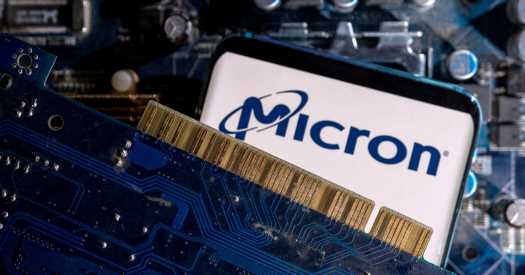Beijing on Sunday told Chinese companies that deal with critical information to stop purchasing products from Micron Technology, the U.S.-based manufacturer of memory chips used in phones, computers and other electronics. Many analysts viewed the move as retaliation for Washington’s efforts to cut off China’s access to high-end chips.
In a statement on its official social media site, the Cyberspace Administration of China said that in a cybersecurity review it had found that the chip maker’s products posed “relatively serious cybersecurity problems.” The problems could “seriously endanger the supply chain of China’s critical information infrastructure” and threaten national security, it said.
China’s action is the latest volley in an economic tit-for-tat between Beijing and Washington that is rearranging the fabric of a sprawling global microchip industry. The decision to bar Micron from selling its chips to key companies could have a ripple effect through China’s supply chains as Micron’s Chinese customers seek to replace the U.S. memory chips with homegrown or Korean versions. South Korean chip makers like Samsung and SK Hynix are Micron’s competitors and already do significant business with China.
Beijing initiated a cybersecurity review of Micron in late March as part of what it called a “normal regulatory measure.” The announcement came after Washington rolled out restrictions in October against China’s semiconductor industry. Micron said at the time that it was “cooperating fully” with the investigation and that its China business was operating as normal.
The company did not immediately respond to a request for comment.
Since the announcement, China has been engaged in an all-out campaign to shore up its homegrown chip industry. Beijing has spent billions of dollars on the efforts at self-reliance and Chinese companies up and down the supply chain have moved to replace Western chips and parts.
The Chinese authorities offered few clues about what they had discovered that posed serious risks. They have also provided little information about what is required of companies during a cybersecurity review. But Graham Webster, the editor in chief of the DigiChina Project at the Stanford University Cyber Policy Center, said that among the risks was the potential for further sanctions by Washington that could cut off important Chinese companies from Micron’s memory chips.
“Supply-chain security includes the risk of a foreign government cutting off supply, which the U.S. government has done in multiple ways for other semiconductors,” Mr. Webster said. He added that China’s decision may have been partly a “derisking measure to avoid further reliance on supplies the U.S. might cut off.”
Washington has urged South Korean officials to prevent its chip makers from filling the market void if Micron was unable to sell its chips to China, The Financial Times reported in April.
China approved a cybersecurity law in 2016 that outlined rules to safeguard what it called “critical information infrastructure,” which refers to technology systems in sectors including telecommunications, transportation and defense that Chinese regulators believe would be vulnerable if they malfunctioned or leaked data.
Micron, which is based in Boise, Idaho, built its first factory in China in 2007. In recent years as relations between the United States and China cooled, it has begun to downsize its operations, reducing the number of Chinese staff and shutting down some operations. As of April, it had about 3,000 employees in Shanghai, Beijing and Shenzhen.
The impact of Sunday’s decision on the company could be sizable. In 2022, Micron reported $3.3 billion in sales in China, roughly 11 percent of its annual $30.8 billion in global sales. It was unclear how much of those sales in China would be affected by the government’s action.
Source: Read Full Article
-
Investment Bank Moelis & Co. Names Marcus Lollie A Managing Director In Its Media Group
-
Fed Chair Jerome Powell Calls Rate Cut Speculation 'Premature'
-
‘Budget has not touched upon unemployment at all’
-
Improving prospects drive auto major Maruti Suzuki India’s shares
-
How FTX Missed a Potentially Lucrative Opportunity

